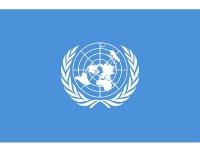Lifestyle
OCEANS and the LAW Of The SEA
Life Itself Arose From The Oceans

(Source: United Nations)
Life itself arose from the oceans. The ocean is vast, covering 140 million square miles, some 72 per cent of the earth's surface. Not only has the oceans always been a prime source of nourishment for the life it helped generate, but from earliest recorded history it has served for trade and commerce, adventure and discovery. It has kept people apart and brought them together.
Even now, when the continents have been mapped and their interiors made accessible by road, river and air, most of the world's people live no more than 200 miles from the sea and relate closely to it.
Even now, when the continents have been mapped and their interiors made accessible by road, river and air, most of the world's people live no more than 200 miles from the sea and relate closely to it.
- Freedom of the Seas
The oceans had long been subject to the freedom of-the-seas doctrine - a principle put forth in the 17th century, essentially limiting national rights and jurisdiction over the oceans to a narrow belt of sea surrounding a nation's coastline. The remainder of the seas was proclaimed to be free to all and belonging to none. While this situation prevailed into the twentieth century, by mid-century there was an impetus to extend national claims over offshore resources.
The oceans had long been subject to the freedom of-the-seas doctrine - a principle put forth in the 17th century, essentially limiting national rights and jurisdiction over the oceans to a narrow belt of sea surrounding a nation's coastline. The remainder of the seas was proclaimed to be free to all and belonging to none. While this situation prevailed into the twentieth century, by mid-century there was an impetus to extend national claims over offshore resources.
There was growing concern over the toll taken on coastal fish stocks by long-distance fishing fleets and over the threat of pollution and wastes from transport ships and oil tankers carrying noxious cargoes that plied sea routes across the globe. The hazard of pollution was ever present, threatening coastal resorts and all forms of ocean life. The navies of the maritime powers were competing to maintain a presence across the globe on the surface waters and even under the sea.
- United Nations Law of the Sea Convention (UNCLOS)
- United Nations Law of the Sea Convention (UNCLOS)
The United Nations has long been at the forefront of efforts to ensure the peaceful, cooperative, legally defined uses of the seas and oceans for the individual and common benefit of humankind. Urgent calls for an effective international regime over the seabed and the ocean floor beyond a clearly defined national jurisdiction set in motion a process that spanned 15 years and saw the creation of the United Nations Seabed Committee, the signing of a treaty banning nuclear weapons on the seabed, the adoption of the declaration by the General Assembly that all resources of the seabed beyond the limits of national jurisdiction are the common heritage of mankind and the convening of the Stockholm Conference on the Human Environment.
The UN´s groundbreaking work in adopting the 1982 Law of the Sea Convention stands as a defining moment in the extension of international law to the vast, shared water resources of our planet. The convention has resolved a number of important issues related to ocean usage and sovereignity, such as :
* Established freedom-of-navigation rights
* Set territorial sea boundaries 12 miles offshore
* Set exclusive economic zones up to 200 miles offshore
* Set rules for extending continental shelf rights up to 350 miles offshore
* Created the International Seabed Authority
* Created other conflict-resolution mechanisms (e.g., the UN Commission on the Limits of the Continental Shelf)
* Established freedom-of-navigation rights
* Set territorial sea boundaries 12 miles offshore
* Set exclusive economic zones up to 200 miles offshore
* Set rules for extending continental shelf rights up to 350 miles offshore
* Created the International Seabed Authority
* Created other conflict-resolution mechanisms (e.g., the UN Commission on the Limits of the Continental Shelf)
- Protection of marine environment and biodiversity
The United Nations Environment Programme (UNEP), particularly through its Regional Seas Programme, acts to protect oceans and seas and promote the environmentally sound use of marine resources. The Regional Seas Conventions and Action Plans is the world's only legal framework for protecting the oceans and seas at the regional level. UNEP also created The Global Programme of Action for the Protection of the Marine Environment from Land-based Activities. It is the only global intergovernmental mechanism directly addressing the connectivity between terrestrial, freshwater, coastal and marine ecosystems.
The United Nations Environment Programme (UNEP), particularly through its Regional Seas Programme, acts to protect oceans and seas and promote the environmentally sound use of marine resources. The Regional Seas Conventions and Action Plans is the world's only legal framework for protecting the oceans and seas at the regional level. UNEP also created The Global Programme of Action for the Protection of the Marine Environment from Land-based Activities. It is the only global intergovernmental mechanism directly addressing the connectivity between terrestrial, freshwater, coastal and marine ecosystems.
The United Nations Educational, Scientific and Cultural Organization (UNESCO), through its Intergovernmental Oceanographic Commission, coordinates programmes in marine research, observation systems, hazard mitigation and better managing ocean and coastal areas.
The International Maritime Organization (IMO) is the key United Nations institution for the development of international maritime law. Its main role is to create a regulatory framework for the shipping industry that is fair and effective, universally adopted and universally implemented.
The International Maritime Organization (IMO) is the key United Nations institution for the development of international maritime law. Its main role is to create a regulatory framework for the shipping industry that is fair and effective, universally adopted and universally implemented.
- Marine shipping and pollution
To ensure that shipping is cleaner and greener, IMO has adopted regulations to address the emission of air pollutants from ships and has adopted mandatory energy-efficiency measures to reduce emissions of greenhouse gases from international shipping. These include the landmark International Convention for the Prevention of Pollution from Ships of 1973, as modified by a 1978 Protocol (MARPOL), and the 1954 International Convention for the Prevention of Pollution of the Sea by Oil.
To ensure that shipping is cleaner and greener, IMO has adopted regulations to address the emission of air pollutants from ships and has adopted mandatory energy-efficiency measures to reduce emissions of greenhouse gases from international shipping. These include the landmark International Convention for the Prevention of Pollution from Ships of 1973, as modified by a 1978 Protocol (MARPOL), and the 1954 International Convention for the Prevention of Pollution of the Sea by Oil.
- Polar Code
In 2014, important regulatory developments in the field of transport and trade facilitation included the adoption of the International Code for Ships Operating in Polar Waters (Polar Code), expected to enter into force on 1 January 2017, as well as a range of regulatory developments relating to maritime and supply chain security and environmental issues.
- Piracy
In 2014, important regulatory developments in the field of transport and trade facilitation included the adoption of the International Code for Ships Operating in Polar Waters (Polar Code), expected to enter into force on 1 January 2017, as well as a range of regulatory developments relating to maritime and supply chain security and environmental issues.
- Piracy
In recent years there has been asurge in the piracy off the coast of Somalia and in the Gulf of Guinea. Acts of piracy threaten maritime security by endangering, in particular, the welfare of seafarers and the security of navigation and commerce. These criminal acts may result in the loss of life, physical harm or hostage-taking of seafarers, significant disruptions to commerce and navigation, financial losses to shipowners, increased insurance premiums and security costs, increased costs to consumers and producers, and damage to the marine environment.
Pirate attacks can have widespread ramifications, including preventing humanitarian assistance and increasing the costs of future shipments to the affected areas. The IMO and UN have adopted additional resolutions to complement the rules in the Law of the Sea Convention for dealing with piracy.
Source : United Nations
Ruby BIRD
http://www.portfolio.uspa24.com/
Yasmina BEDDOU
http://www.yasmina-beddou.uspa24.com/
Source : United Nations
Ruby BIRD
http://www.portfolio.uspa24.com/
Yasmina BEDDOU
http://www.yasmina-beddou.uspa24.com/
Ruby Bird Yasmina Beddou Life Oceans United Nations Law Of The Sea 140 Million Square Miles 72 Per Cent Earth Surface
Liability for this article lies with the author, who also holds the copyright. Editorial content from USPA may be quoted on other websites as long as the quote comprises no more than 5% of the entire text, is marked as such and the source is named (via hyperlink).






